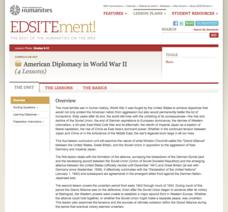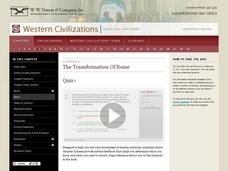US National Archives
WWII: Western Europe 1939-45 – Deception and Bluff
World War II left the British desperate for help in any form—including in the form of a magician! High schooler conduct research on Jasper Maskelyne, a stage magician who used his talents to deceive the Germans on the war front, before...
US National Archives
WWII: Western Europe 1939-45 – Resistance and SOE
Germany seemed to be unstoppable in the early years of World War II, but the tireless and sacrificial work of the Special Operations Executive (SOE) helped to steer the war in another direction. After exploring primary source documents,...
National Endowment for the Humanities
American Diplocmacy in World War II
The end of World War II saw the world deeply changed over the last few years. Four thorough lessons explore post-war Europe, America, and Asia through reading assignments and discussion questions about the Grand Alliance and the signing...
US National Archives
WWII: Western Europe 1939-45 – Hamburg
Was bombing German cities an effective means to an end, or was it a war crime? Could it be both? Young historians ponder these questions with an activity that prompts them to use primary sources to summarize the debate surrounding RAF...
US National Archives
WWII: Western Europe 1939-45 – Battle of Britain
Had Britain not emerged as the victors of the 1940 Battle of Britain, World War II would have ended much differently—and the world as we know it would be catastrophically altered. Learn more about this pivotal moment that kept the Nazis...
Smithsonian Institution
World War I
How did World War I effect the United States' status as a world power? Pupils examine a website to learn many interesting facts about American involvement during World War I. They read passages and interact with artifacts in an online...
US National Archives
WWII: Western Europe 1939-45 – Invasion
Without the benefit of history, Western Europe in the 1940's had no idea what was about to befall them. Class members use primary sources, including political cartoons, videos, and internal documents, to analyze how much of a threat...
Curated OER
Western Civilizations, Chapter 2: Gods and Empires in the Ancient Near East
Ancient Hebrew history comes to life through this online western civilizations tool, which follows history in detail from ancient origins to modern-day. Chapter two covers ancient eastern cultures, including beginnings of Hebrew...
US National Archives
WWII: Western Europe 1939-45 – D-Day
D-Day, also known as the Normandy Invasion, was a true turning point for the Allied forces and one of the most successful campaigns of World War II. After researching the factors that contributed to the campaign's success, high schoolers...
US National Archives
WWII: Western Europe 1939-45 – End of the War
You are Winston Churchill, and on May 9th, 1945, you receive millions of grateful cards and telegrams. How do you respond? High schoolers put themselves in the Prime Minister's chair with an activity that prompts them to respond to a...
US National Archives
WWII: Western Europe 1939-45 – Occupation
Warsaw, Poland, suffered much of the blunt of World War II—but according to Polish letters from the early days of Nazi occupation, other parts of the country were much worse off. High schoolers use the letters and contemporaneous...
Curated OER
Chapter 6: Christianity and the Transformation of the Roman World
The history of the Christian faith makes up a fascinating element of western civilization, as demonstrated in this comprehensive online resource. A chapter quiz features short-answer questions based on the ministry of Jesus, the spread...
AGSSS
World Regions
Help your learners to visualize where historical events have taken place around the globe with a map that details the major regions of the seven continents.
New York City Department of Education
Geography and Early Peoples of the Western Hemisphere
Young historians discover the early people of the western hemisphere. The unit explores how the land changed, how it was used and homes of early Americans such as Incas, Mayans, Inuits, Aztecs, and Pueblos. Individuals also examine these...
Indiana University
World Literature: "One Evening in the Rainy Season" Shi Zhecun
Did you know that modern Chinese literature “grew from the psychoanalytical theory of Sigmund Freud”? Designed for a world literature class, seniors are introduced to “One Evening in the Rainy Season,” Shi Zhecun’s stream of...
Curated OER
Compare and Contrast Timelines of the World
Seventh graders create a classroom timeline of important world events. This lesson is meant to be used during the entire school year. As the school year goes along, events are added to the timeline as chosen by the class. The events are...
Curriculum Development Institute
Factors for Economic Integration in Western Europe since 1945
While the European Union has been a part of economic landscape for decades, it grew out of a period of economic integration after World War II. Using a round table method, class members analyze and discuss the events leading up to the...
Common Core Sheets
Placing Events on a Timeline
Put important events in chronological order with a lesson about timelines. With a variety of topics stemming from world history, the packet of worksheets provides analytical activity for learners to decide where certain events fall...
US National Archives
WWII: The Atlantic 1939-45 – Battle of the Atlantic
The most dangerous line of attack during World War II wasn't the German planes soaring above Britain, but the U-Boats cutting off their supplies of food and equipment. Learners research the Battle of the Atlantic, the German campaign to...
Curated OER
All Quiet on the Western Front Summary
Why should high schoolers bother to read All Quiet on the Western Front? Give them this short synopsis to introduce them to the story. There's also a short section encouraging readers to ponder why they're being asked to read this story.
Cave Creek Unified School District
Crusades and Culture in the Middle Ages
The Crusades sounds like a glamorous time period in the Middle Ages full of glory—but was it? Scholars find and review the truth of the Crusades' influence on the world through the resource. The study guides, separated individually by...
Curated OER
Western Civilizations, Chapter 27: The Cold War: Global Politics, Economic Recovery, and Cultural Change
Keep your scholars organized using this study plan and progress report tool, one of many great learning strategies featured in this online western civilizations resource! Although designed for use alongside the Western Civilizations...
Council for Economic Education
Why Didn't China Discover the New World?
Who was Zheng He and why haven't we heard of him? Scholars consider the question as they compare his vast expeditionary force to that of Christopher Columbus. Young historians then ponder the intersection of science, economics, and...
Curated OER
World War 1: A New Kind of War
Guide reading and enhance your students' understanding of WWI with this rich presentation. Topics covered are warfare, weapons, technology, government actions, women in war, and the effects of war on the home front and around the world....

























